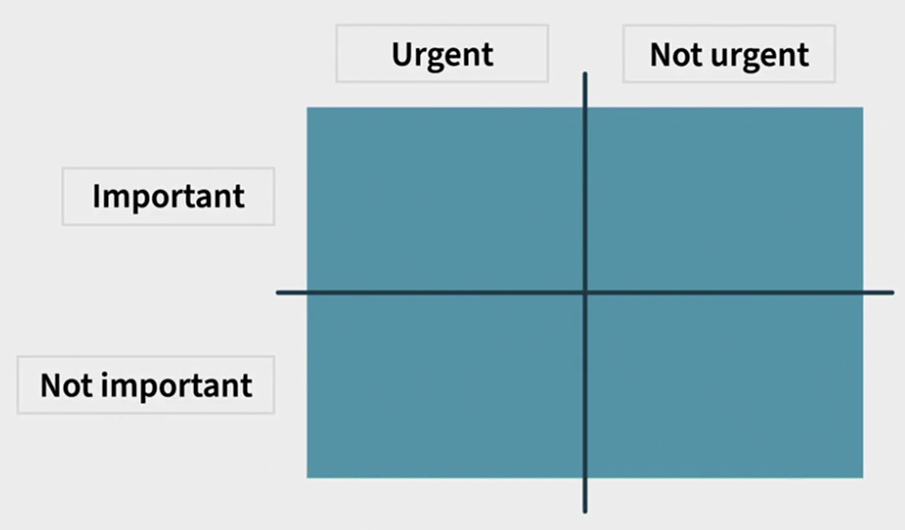| Prioritizing Your Tasks | ||
| Instructor: Dave Crenshaw | ||
| Released: 4/18/2022 | Course Details 36m General | |
| Skills Covered Task Management Priority Management | Course Link | |
| Professional Certifications and Continuing Education Units (CEUs) National Association of State Boards of Accountancy (NASBA) – 1 CPE | ||
How to Prioritize
A new perspective on time
Eisenhower Decision Matrix

We won’t be using this method which dates back from the 1950s.
Two radical changes has impacted this model; interruptions and speed. Switching attention incurs a cost. Create a filter for tasks and opportunities.
What is most valuable?
The value of your time
Is this my most valuable activity?
How much is the activity worth per hour?
Focusing on value per hour creates freedom.
Finding Your Most Valuable Activities
- List all work activities
- Estimate value per hour
- Rank each activity
Time-Value Prioritization Overview
- No, never again (largest part of the funnel is to protect us from stuff that waste our time)
- Perhaps (tasks that have no clear decision attached to them)
- Yes, but not now (value is extremely low) – positive procrastination
- Yes, but not anyone (use technology to fight technology – apps and hardware to take care of the task permanently)
- Yes, but not me (identify tasks to be delegated)
- Yes, me (passed through the filtration system and is the MVA)
Time value step one: Not me, never again
Is this task something you never ever want to do or see again?
Say no to things of low value.
Zero-Value Activities
- Wasting time
- Negative self-talk
- Senseless internet arguments
- Addictive and destructive behaviors
What’s something that I know I should never do again?
Time value step two: Perhaps, but not now
Ideas must be gathered for review. Ideas help you move forward.
By putting ideas on the “perhaps list” we respect the value of an idea.
Time value step three: Yes, but not now
The ideas has some value and we have some commitment to complete them. This may be tasks that we don’t have deadlines so we will positively procrastinate.
Procrastination can be your friend.
When is the latest that I have to start thinking about this?
Use a reminder on a calendar to delay thinking about the task until that date.
Time value step four: Yes, but not anyone
We should have filtered half of the list of items by now.
“Yes, we need to complete this thing and yes it has value, but no human being should do this.”
Can I automate this task?
A small investment up front can save time in the future.
Time value step five: Yes, but not me
Abdication
Telling someone to do something that you hope turns out OK.
Delegation
Providing clear instructions and expectations, and following up on results.
“Would it be more productive if someone else performed this task instead of me?”
“Would it be more productive if I trained someone else to properly perform this task instead of me?”
“Would it be more productive if I hired the right person to perform this task instead of me?”
Always consider the value of the task.
Time value step six: Yes, me
You are left with the Most Valuable Activity.
If you end up with more tasks that are part of your MVA’s, then go through the funnel process all over again.
Change being busy to being valuable.
Perform you most valuable activities promptly.
- If it takes five minutes or less (regardless of the value), do it now.
- If it takes between five and fifteen minutes, and there is no deadline, create a task reminder.
- If it takes fifteen minutes or more, or it has a deadline, schedule it to the calendar.
 | Remember! To experience the full benefit of this guide, I highly recommend you watch the full training session. |

